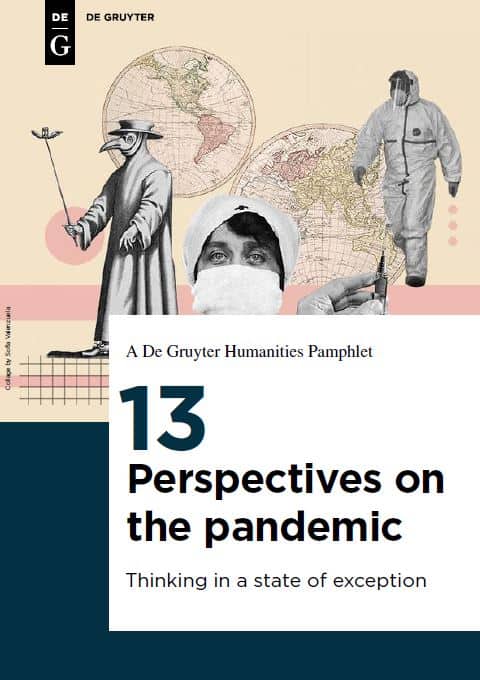Antisemitism on Social Media in Times of Corona
Since the beginning of the coronavirus pandemic antisemitic myths and conspiracy theories have been thriving. They meet the demand for narratives that promise knowledge — a demand that is growing in times of crisis and uncertainty.
This essay was first published in the free digital pamphlet 13 Perspectives on
the Pandemic: Thinking in a state of exception.
The antisemitic stereotypes that are currently spreading through social media are as irrational and contradictory as antisemitic stereotypes have always been. In times of a global pandemic, they merge with a number of conspiracy myths that relate to the coronavirus.
An analysis of the British Community Security Trust identifies five major antisemitic tropes:
- the virus is fake and is a Jewish conspiracy that aims to mislead the public;
- the virus is real and is a Jewish conspiracy. This myth appears in all forms and colors, from the idea that Jews are trying to make money from the crisis to the idea that Israel has created the virus and now blames it on China to start World War III;
- Jews are superspreaders of the Virus;
- celebrating the death of Jews that died of the virus;
- public calls to spread the virus to Jews with the aim to kill them. In addition, online events on the platform Zoom that were commemorating the Holocaust have been interrupted by people displaying swastikas as well as pro-Palestine slogans.
Crisis as Opportunity for Messages of Hate
Whereas this so-called Zoom-bombing appears as a new phenomenon, the antisemitic slogans in the context of the coronavirus crisis do not come as a surprise. The crisis serves as an opportunity for antisemites to spread their hateful messages. The Kantor Center at Tel Aviv University is right to point out that blaming Jews for natural, political, and economic crises is not a new development. For centuries this has been the essence of an antisemitic worldview. The important question is whether the coronavirus crisis serves rather as a temporary opportunity to spread antisemitism or if the current crisis will have a lasting effect.
A Dangerous Trend
I argue that the latter is the case. The severe problem in the current situation is not only the spreading of certain conspiracy theories. In addition to that, the dissemination of conspiracy thinking will have a lasting effect and will increase a dangerous trend: the “shift of the phenomenon of antisemitism from the fringes of society to the mainstream. This shift is evident in many Western societies and especially in their social media”. The expansion of conspiracy thinking fuels this trend. A study from Harvard University found that 31% of US Americans believe that the virus was intentionally created and spread, and 29% believe it was exaggerated to hurt president Trump. A study from Oxford University analyzed perceptions in England and found that “60 % of adults believe to some extent that the government is misleading the public about the cause of the virus, 40 % believe to some extent the spread of the virus is a deliberate attempt by powerful people to gain control” and “20 % believe to some extent that the virus is a hoax”. The same study showed that 20 % believe to some degree that “Jews have created the virus to collapse the economy for financial gain”.
“Alternative Information”
Antisemitic and conspiracy thinking are mindsets that do not allow for social events to be coincidences, unintended or contradicting, as the virus and the policies to stop the virus from spreading have partially been. Antisemitic and conspiracy thinking are attempts to (re)gain control; they offer explanations and guidance in a world that is turned upside down due to something invisible to the human eye. In the eyes of the beholder, they turn helplessness into orientation, uncertainty into knowledge, and thereby also offer an emotional benefit: the consumption of “alternative information” becomes an experience of self-empowerment, a way to magnify one’s own ability to “understand” what the crisis is all about and form an independent viewpoint.
Everywhere we find this kind of “alternative knowledge”, with antisemitism just a small number of clicks away. The number of people who (sometimes unwillingly) fabricate their own partisan information through social media is growing. Those people are now starting to follow prominent conspiracy theorists on social media, and will continue to get their information through these channels in post-coronavirus times. And as the channels grow the algorithms of social media providers will suggest them to a wider audience.
Quo Vadis?
Colleagues have argued for the need to keep cool and not give conspiracy activists the attention they are looking for. I disagree. The conspiracy theorists are thriving because they have been ignored, because of the wider public thought that western societies are strong enough to deal with just a few lunatics. But the lunatics now hold important offices, have built a network of alternative media, and have an army of followers who are well prepared for the next crisis — when the middle-range impact of the current crisis will be kicking in. It would therefore be wise to take this milieu as seriously as the conspiracy activists take their conspiracies.
Learn more in this related title from De Gruyter
[Title image via Getty Images]
